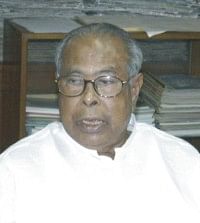In Memoriam
Kibria's tragic death a grievous blow to political sanity
M.M.Rezaul Karim
My friend, fellow diplomat and political adversary, SAMS Kibria is no more. He laid his life and became a cruel victim to the machinations of those engaged in the nefarious design of destroying peace, stability and the democratic fabric of the nation. The splinters of the grenades that killed an internationally recognised diplomat, a renowned economist and an astute politician with his comrades caused far more damage than merely killing those mortals. Perhaps that was what had been intended by the perpetrators of this heinous crime. The authorities, as committed, must find the motives and seek the beneficiaries of such recurrent attacks, and proceed, with redoubled efforts, to promptly investigate and punish the culprits. Repeated pledges of both the BNP and the Awami League governments to unfurl all such crimes committed in the past, except for the Udichi massacres, have come to naught. This is most disconcerting, to say the least.I knew Kibria half a century ago in the fifties during the University days. But the relations blossomed into friendship when we both were assigned in New York in early sixties. He was a Second Secretary and I was a Third Secretary. Our two families lived in two adjacent buildings and we often spent time in each other's apartment, playing bridge, listening to music or simply chatting. One evening Mrs Kibria retired around 11 PM leaving us playing bridge in her apartment. She came back next morning only to see us play there still. It startled her so much that we had to concoct a story saying that we had just come back and resumed our game in the morning. She, an epitome of innocence and affection, believed us or that is what we believed she did. On many occasions the two families used to go out fishing in the seven lakes area and to pluck apples from orchards near the White Mountains. The little Nazli Kibria, who is now a Ph.D, had to be consoled and helped every time she failed to reach the branches laden with apples. In the fateful evening when I telephoned Mrs Kibria to enquire about her husband's injury, she appeared to have been still ignorant it was fatal. She only expressed her bitterness and total dismay at good people being in politics. Kibria was a brilliant student all throughout his life and we were proud of him. He was senior to me in diplomatic service by several years, yet somehow he respected my views and counsel. I succeeded him as Director General in the Foreign Ministry, while he was promoted as Secretary. He was Foreign Secretary of President Ziaur Rahman and played due role in shaping his concept of the SAARC. Zia rewarded him by nominating him to the post of UN Under Secretary General and Executive Secretary of the ESCAP instead of the hot-runner, former Chief Secretary and Presidential Adviser the late Shafiul Azam, who also stood first in the Pakistan Superior Services Examination, though much earlier in the first batch of 1949. In Bangladesh Kibria's entry into politics, especially his joining the Awami League, was a historical accident. Those who know it realise the strange nature of fate, which is pre-determined. He loyally and vigorously served his Party and was a beacon of logic, moderation and patriotism among his fellow party-men. The sense of patriotism grew intense with some of us, who had severed connection with the then government of Pakistan in 1971 and joined the liberation movement of Bangladesh. Later, the volatile political movements since 1992 did not deter us, despite belonging to the opposing political parties, from continuing our interaction and also playing golf together regularly. Though we did not mix politics with personal relationship, on several occasions we hardly could help express utter disappointment at the prevailing situation, albeit privately. Once we prepared a formula of compromise on a serious political issue on the golf course and submitted it to our respective political Chiefs only to be rebuffed strongly. Later, we became instrumental in invoking the good offices of the Commonwealth at the behest of its Secretary General, Chief Emeka Anyaoku, a personal friend of mine for over three decades, who sent a facilitator, Sir Ninian Stevens, in 1994 to resolve differences between the Awami League and the ruling BNP. This endeavour also failed and met the same fate of our golf diplomacy. Only once he hurt me, emotionally, when shortly after his becoming Finance Minister he terminated my services as Chairman of the PKSF (the apex micro-credit financing body of the country). My despair was not for dismissing me, but to do so even before deciding upon who would replace me. I realised that the action was taken pursuant to a decision of his Party high command. However, I never allowed myself to give vent to my feelings and we continued to play our games as if nothing untoward had happened. Mr Kibria was also not without his faults. The one I was not happy about was his overt reluctance to give away position and money, even in games. Whenever he lost a hole in golf, he would review the position several times before conceding defeat and parting with a Ten Taka note. Perhaps it was imbedded in the nature of the man, who had never stood second in his life, not to concede easily and for a conscientious former Finance Minister not to part with even a paltry sum of money without verification. May Almighty Allah rest my friend's soul in peace in Paradise. M.M.Rezaul Karim, a former Ambassador, is a member of BNP's Advisory Council.
|

|